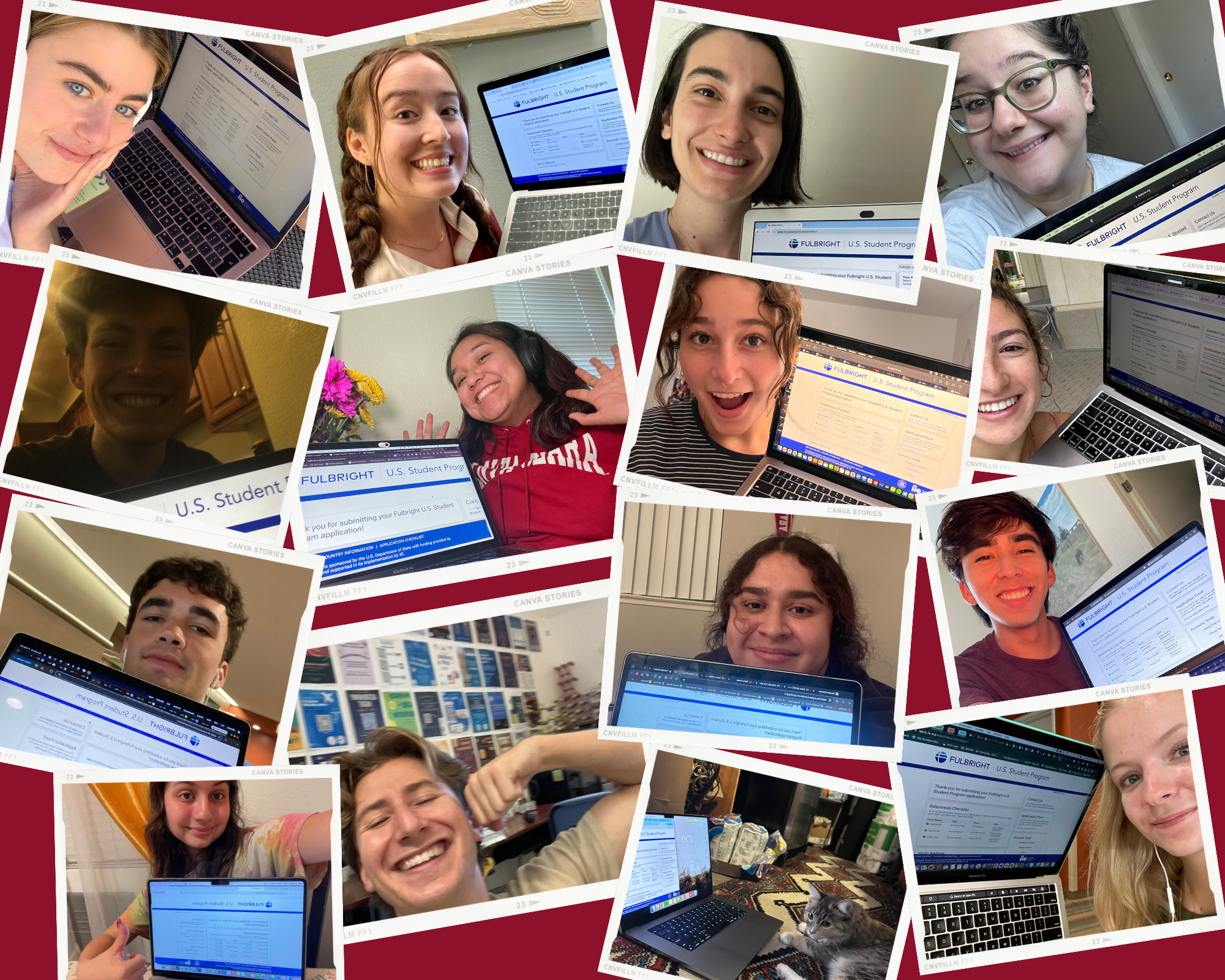Fulbright is for college graduates who want to spend the better part of a year in one country, serving as a cultural ambassador for the United States.
Many students are more competitive for the Fulbright program than they realize. There is no minimum GPA. If you're interested, we encourage you to read more about the opportunity on this page and consider applying in the 2025 cycle.
We are holding an information session on May 15 from 6-7pm. Register here.
In the past 7 years, we have supported 170 Fulbright applicants, with 69 semi-finalists, 14 alternates, and 23 winners. Here are some of our 2024 applicants when they hit submit:

We're hoping to have our biggest class ever in the 2025 cycle. Email osf@scu.edu with any questions and sign up for our summer Fulbright Camino Community here!
What is Fulbright?
The Fulbright program is actually hundreds of programs under a single umbrella application. One of the hardest parts of applying is deciding which of the many options to choose. You have to decide where you want to spend your year and what you will do while there. Each country has a different set of priorities for its Fulbright participants, so you need to do a good amount of research to match your interests and skills with a country where you want to be.
What do people do when they are on a Fulbright?
There are two types of Fulbrights:
1) Study/research grants, which sponsor your own academic study or research, and
2) English Teaching Assistantships (ETA), which sponsor your work as an English language instructor.
Some countries have both programs, while others only have one. The way to learn what is offered in each country is to visit the country page on the Fulbright website. On these pages, you will also learn about the particulars of that country’s Fulbright program.
Some countries provide study/research grants to students at all levels, while others are only for students working on doctoral dissertations. Some countries provide funding to work on a master’s degree at one of their institutions of higher education, and some countries require affiliation with one of their universities, while others only support independent research.
Some countries’ ETA programs place recipients in college classrooms, while others work entirely at the elementary-school level. And, perhaps most importantly, some countries require a high level of proficiency in the local language, while others do not expect any familiarity with their language.
How can I write a competitive Fulbright application?
Before you can write a competitive application, you need to go through an intensive discernment process. You will want to discuss your options with trusted friends and family, as well as with your professors and other mentors. You should also spend a good amount of time perusing the Fulbright website, which has a wealth of information. In addition to each of the country pages, there is a grantee directory, which lists every Fulbright grantee and their project title, and is searchable by country, year, topic, and institutional affiliation. Do not be afraid to track these people down and ask them questions about their experiences. This is especially true for the Santa Clara alumni!
The most competitive applications convince the reader that the selected program is a perfect fit for the student and vice-versa. In order to do this effectively, you need to think about how your prior experiences demonstrate a strong potential of success in your chosen Fulbright activity, and how your proposed Fulbright activity will help you with your career trajectory. You also need to articulate a strong country rationale, which convinces the reader that your proposed activity must be done in the country to which you are applying.
If you are proposing to do a research project, you need to find an organization or institution with which to affiliate. Some students thoroughly articulate their research proposal before reaching out to potential affiliates, while others develop their research in coordination with their affiliate. This process takes time, so, as intimidating as it might seem to reach out to someone on the other side of the world, you need to begin without delay.
How does OSF help Fulbright applicants?
The OSF helps each year’s applicants through the process of applying for the Fulbright by providing resources and a community of applicants with which to share application strategies as well as drafts of your statements. We have an internal review process which matches you to a faculty mentor who will provide developmental feedback on a nearly completed draft of your application. In addition, the OSF will review your letters of recommendation and provide feedback to your letter-writers to help strengthen your application.
If you plan to apply for a Fulbright in the upcoming application cycle, please sign up for our summer Fulbright Camino Community here and join our information session on May 15 from 6-7pm. RSVP here.
You can also drop in to our spring office hours:
- With Naomi Levy: Mondays 1:00pm-3:00pm via Zoom (except 5/26)
- With Stephen Carroll: Tuesdays 1:30pm-4:00pm book appointment here
- With Matt Harrigan: Thursdays 10:00am-12:00pm via Zoom
- With Loring Pfeiffer: Fridays 9:30am-11:30am via Zoom
- With On Shun Pak: Fridays 3:00-5:00pm via Zoom
If those times do not work, email osf@scu.edu to make an appointment or ask any questions.